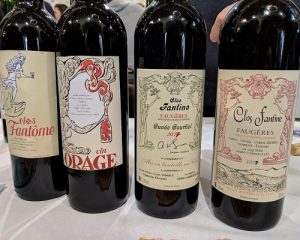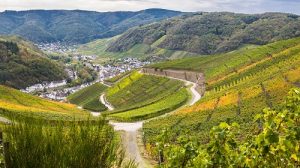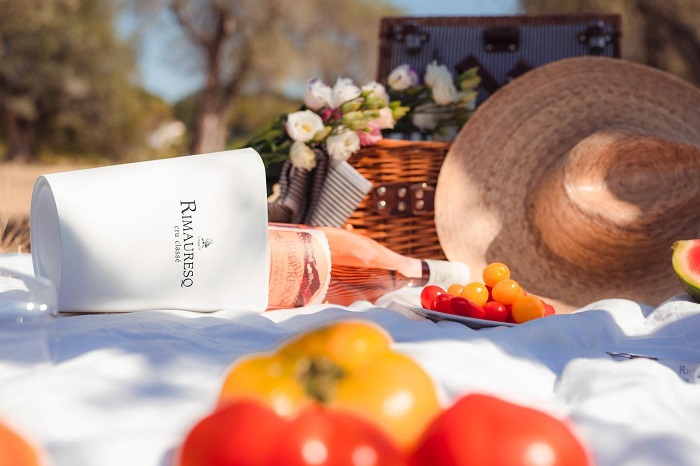
Domaine de Rimauresq is a Côtes de Provence cru classé and a great classic of the appellation, producing a top quality tricolore of red, rosé and white for several decades already. The estate boasts a magnificent terroir at the foot of the Massif des Maures and its wines have real personality. Since the 2020 vintage, the estate is certified organic.
A historical estate split between Provençal and Scottish cultures
Rimauresq takes its name from ‘Real Mauresque’, the river that runs from the Maures massif through the estate. In the heart of wine-growing Provence, twenty minutes east of Toulon, the Rimauresq vineyard extends over 50 hectares, at the foot of Notre-Dame des Anges, one of the peaks of the Maures mountains which rises to 767 metres. The estate dates back a long way, but its modern history began in 1882 when a certain Augustin Isnard started to bring back to life the vineyard devastated by phylloxera. Three years later, Rimauresq was awarded a silver medal in Toulon for his successful reconstruction of its vineyard and the quality of its wines. During the 20th century, Rimauresq, along with a few other estates in the region, was behind the creation of the Côtes de Provence syndicate with the aim of obtaining an AOC and in 1955 it was one of the estates that obtained the “cru classé” mention in the Côtes de Provence AOC.
The property was then (and still is) one of the most prized in the region, in particular for its red wines that age harmoniously – they’ve got over ten potential cellaring years – thanks to a blend that includes a good proportion of Cabernet Sauvignon.
In 1988, the Wemyss family, of Scottish origin, acquired the estate from the Isnar clan, who had owned it for over a hundred years by that point. Major modernisation work in the cellars and in the vineyards was then carried out to make Rimauresq one of the classic references in Provence.
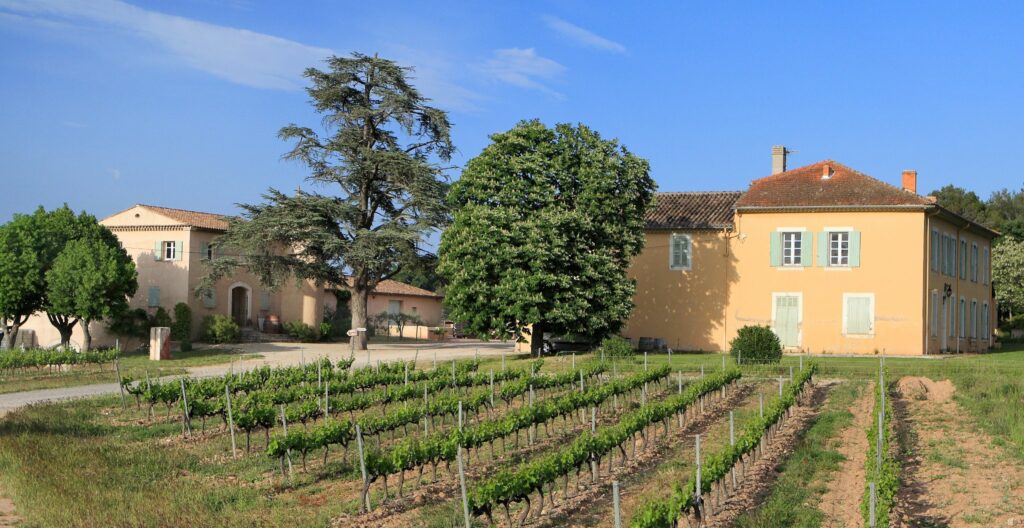
An atypical property mixing sun, terroir and the Mistral
The microclimate on this southern estate is a real singularity of the Côtes de Provence appellation. The vineyard, which faces north and is situated at an altitude of 140 to 190 metres, enjoys the combined influence of the Mistral wind and the beneficial shade of Notre-Dame des Anges.
The terroir is essentially clay, schist, and crystalline, with certain spots that are sandy and stony, and many parcels boast a combination of soils (degraded schist, pink sandstone, rolled pebbles). It is this unusual diversity that allows Rimauresq to excel in all three colours when it comes to their winemaking.
Certified organic and rewarded for it
Nine grape varieties are tended to in the Rimauresq vineyard: Grenache, Syrah, Carignan and Cabernet Sauvignon for the reds; Rolle and Ugni Blanc for the whites, and finally Cinsault and Mourvèdre for the rosés (in addition to the red grape varieties). The whites are produced in small quantities. Indeed, the yields are controlled at around 25 hectolitres per hectare, and in good vintages, they represent no more than 10% of the total production with around 15,000 bottles being produced across the three cuvées.
At Rimauresq, everything is done to preserve the best of the vine’s fruit. To begin with, the soils are worked throughout the year. After the harvest, the subsoil is “decompacted” with a subsoiler on alternate rows, one season out of three, in order to facilitate the deep rooting of the vines. After careful soil analysis, the poorest plots can be amended with organic manure.
During the winter, the edges of the plots and the banks of the rivers are cleared of all parasitic vegetation (scrub, copses, small trees). The aim is to encourage the circulation of air and light to avoid the creation of pockets of humidity, as these are harmful to the flowering and general health of the grapes. After pruning, the shoots are crushed and buried in the rows to serve as natural fertilizer. The ploughing continues until August to maintain a loose, grass-free soil that will absorb the slightest drop of rain.
On a selection of plots sensitive to erosion, the estate practices grassing. The following autumn, the soil is ploughed, and the plant matter is composted naturally. As the roots decompose, they will free up cavities that will soften the soil without ploughing and will better absorb rainfall.
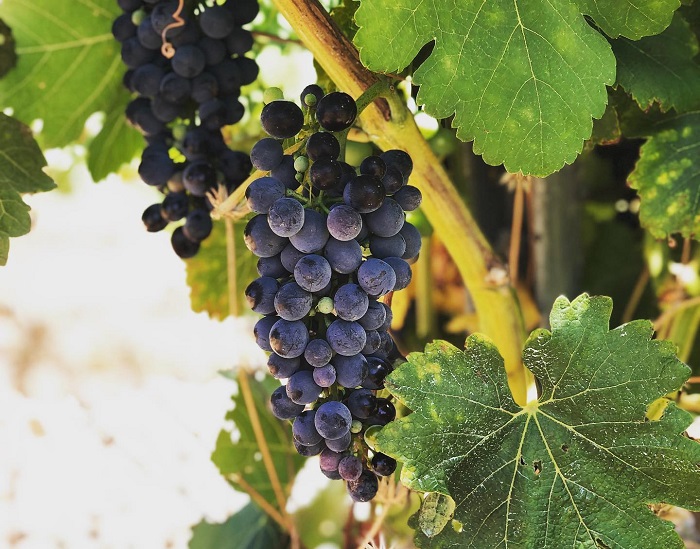
Since 2020, the estate has been certified organic, following the usual three-year conversion period. This certification is a reward for the last twenty years of work carried out with respect for the environment.
A half-buried gravity-fed winery located in the middle of the vines receives the grapes when they have reached the desired ripeness. Vinification of the rosés begins with a morning harvest to preserve the freshness of the night in the heart of the fruit. The crushed grapes are macerated for a long time in thermo-regulated stainless steel tanks. During pressing, which remains moderate to obtain the best juices, the press and free-run juices are separated and chilled. The juices are then fermented at low temperature in stainless steel tanks for two to three weeks. After fermentation, the whites and rosés are aged on the lees with regular stirring to further enrich the wines with richness and aromas. Malolactic fermentation is blocked to preserve the freshness of the wines. The wines are fined and lightly filtered on a plate before bottling.
All this work wasn’t for nothing as the estate received a gold medal for its 2022 R rosé at the Concours Général Agricole de Paris in 2023.
Wines by Domaine Rimauresq currently on sale
Rosés
- Côtes de Provence Cru Classé: A beautiful fruity and floral nose, a dense, ample and coating palate… This is a subtle and generous rosé at the height of its renown!
- Côtes de Provence R de Rimauresq: This structured, concentrated Côtes de Provence can easily stand in for a red wine during a meal. But it’d equally pair with paté and fig chutney canapés!
- Côtes de Provence Quintessence: This is an intensely fruity rosé to serve on a sunny afternoon or with summer dishes such as marinated salmon and barbequed dishes. A must when the mercury rises!
White wines
- Côtes de Provence Cru Classé Classique de Rimauresq: Complex, aromatic, generous, with a long palate, this 100% Rolle has energy abound! Open it a little before you’d like to serve it and pair it with dishes that have a sauce.
- Côtes de Provence R de Rimauresq: The estate’s flagship wine, this Provence cru classé is entirely made from Rolle.
- Côtes de Provence Quintessence: A blend of Rolle and Ugni Blanc vinified in the Burgundian style from a provençal terroir.
Red wines
- Côtes de Provence Cru Classé Classique de Rimauresq: A flavourful red Côtes de Provence that delivers fine tanins and notes of garrigue shurbland plants and spices as well as plenty of fruit.
- Côtes de Provence Quintessence: The signature of a grand cru classé provençal, this wine calls for a gastronomic marriage. For example, pair it with a truffle risotto or a honey-roasted duck breast served with jammy figs.
All of this is to say that Rimauresq comes with our heartiest recommendations, in all its three colours! You’ll find a selection of the estate’s wines for sale on our site.


